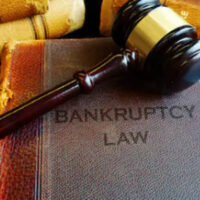How Does Bankruptcy Affect A Florida Probate Estate?

During the administration of a Florida probate estate, the personal representative (executor) is responsible for gathering the estate’s assets and paying any creditors to whom the decedent owed money. These debts and other estate administration expenses must be satisfied before any distribution is made to the estate’s beneficiaries. If there are insufficient assets to pay all the creditors, the estate is said to be insolvent, and the beneficiaries (and many of the creditors) will typically walk away with nothing.
But what happens if the decedent filed for bankruptcy prior to their death? Unlike probate, which is handled at the state level, bankruptcy is a federal legal process used by people who are unable to pay their creditors. So if the debtor dies before their bankruptcy case is complete, how does that affect the probate of their estate, and vice versa?
Completing a Chapter 7 Bankruptcy
In the case of a Chapter 7 bankruptcy, the law is fairly straightforward. Chapter 7 is what is called the “liquidation” form of bankruptcy. What this means is that the debtor must turn over certain non-exempt assets to a court-appointed trustee. The trustee then liquidates those assets and uses the proceeds to pay back the debtor’s creditors as much as possible. Any debt that remains unpaid is then discharged by the bankruptcy court, meaning the debtor is no longer legally obligated to pay.
Because the trustee is really the person responsible for overseeing the Chapter 7 process, the debtor’s death during this process effectively changes nothing. Indeed, federal bankruptcy rules are quite explicit on this point: “In such event the estate shall be administered and the case concluded in the same manner, so far as possible, as though the death … had not occurred.”
In practical terms, any assets that were exempt from the bankruptcy estate would still pass through the debtor’s probate estate. And in some cases, the bankruptcy can actually help the probate process. Since most of the decedent’s debts were discharged in Chapter 7, those creditors can no longer pursue claims against the probate estate, potentially leaving more for the decedent’s beneficiaries.
Continuing a Chapter 13 Bankruptcy
Not all debtors can or do seek bankruptcy protections under Chapter 7. Many instead file under Chapter 13. The key difference between Chapters 7 and 13 is that with the latter, the debtor is responsible for presenting a play to repay their creditors over a period of 3-to-5 years. A discharge is only granted only after the repayment plan is completed.
Since the debtor continues to play an active role in a Chapter 13 case, their premature death can complicate the bankruptcy process. The rules state that in the event of death, the bankruptcy could may dismiss the case altogether or “if further administration is possible” allow it to continue as if the debtor were still alive. Usually, a Chapter 13 case will only continue if the heirs or beneficiaries of the estate are willing to continue the process and assume the responsibility of making payments to the creditors. This may be a viable option if the beneficiaries want to keep property that is secured by a creditor’s interest.
Speak with a Florida Probate Attorney Today
If you are involved in any legal matter related to probate and need advice from an experienced St. Petersburg estate and trust litigation lawyer, contact Legacy Protection Lawyers, LLP, today to schedule a consultation.
Source:
law.cornell.edu/rules/frbp/rule_1016
